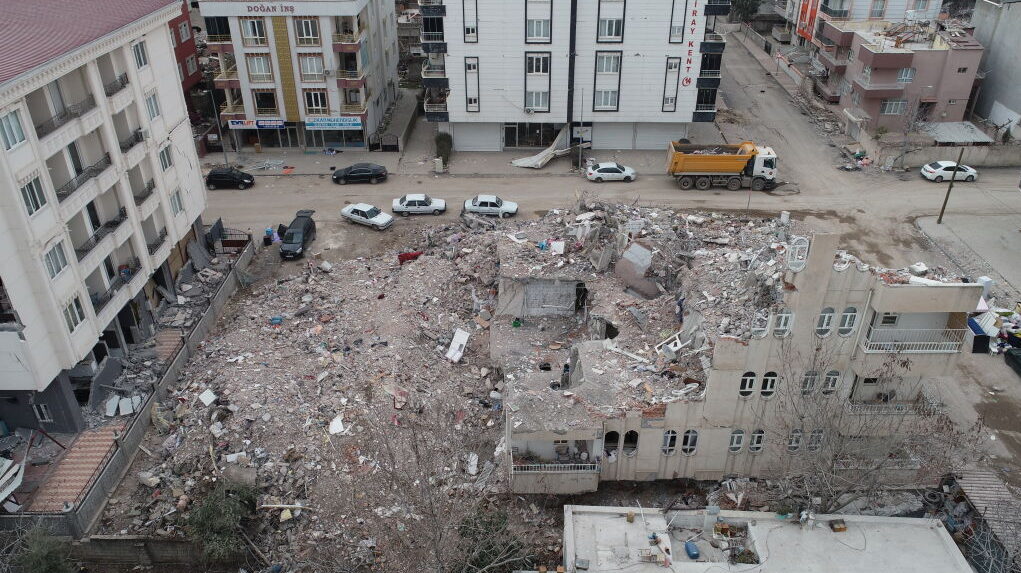Anger Against Turkey’s Government Could Risk Erdogan’s Reelection, Analysts Say
Criticism grows against government's earthquake response and preparation ahead of elections scheduled for spring
Seda, 37, sits in a small, blue camping tent in Adana, one of the cities hit hard by the 7.8-magnitude earthquake that rocked Turkey and Syria nearly two weeks ago, explaining that she had to find her own tent to live in because the government did not provide enough for everyone.
She said there also has been poor communication from Turkey’s national disaster agency, AFAD, and confusion about what to do.
“The government helped us but it’s really, really limited,” Seda told The Media Line.
She is now one of the more than 1 million people made homeless by the disaster.
A juice box, grey backpack and several blankets are scattered across her tent, a cushion from the cold dirt floor.
She has been living like this since the day the earthquake struck on February 6.
“It’s really cold. We have blankets but it’s not enough,” she said. “My building is damaged, I don’t know where to go.”
Like many others living in tents in the earthquake region, Seda has a fire to keep her warm but said she is afraid of the air pollution it could emit.
It’s really cold. We have blankets but it’s not enough. My building is damaged, I don’t know where to go.
Anger over the handling of the disaster has been expressed across the country, with many complaining that rescuers were slow to get to many areas.
The size of the area impacted by the temblor and its aftershocks spans 10 provinces, and some roads were damaged, adding to the difficulties in bringing rescuers and aid.
However, Turkish President Recep Tayyip Erdogan admitted there had been “shortcomings” in the response, but also suggested the disaster was “destiny.”
Attention has focused on poor construction of buildings, which many believe has accounted for the high death toll.
Imdat Oner, a former Turkish diplomat, said he believes that videos that have spread through social media have especially contributed to the public anger.
One video with 1.3 million views on Twitter showed the transport minister and another official with Erdogan’s party leaving Adiyaman, one of the cities gravely impacted by the quake, when an angry crowd started shouting, with some hitting the official’s cars as they left.
In response to anger over construction, the government has issued more than a hundred warrants for contractors involved in damaged buildings, with footage of some of them detained by police being broadcast across Turkish media.
Contractors were given more leeway after a 2018 law provided them with amnesty for illegal buildings as long as they paid a fine, meaning the government knew people continued to live in buildings that were not up to code.
The head of Turkey’s Chamber of Civil Engineers said after it passed that the law would turn cities into graveyards, Reuters reported.
That warning came in 2019 after 21 people were killed when a building collapsed in Istanbul, a building which had benefited from the amnesty law.
Oner argues that the attention focused on contractors is a way to divert the anger away from the government.
“I do not think that people, especially in the earthquake region, will buy the shifting-blame strategy of the government. Many of those buildings built during [the] Erdogan era collapsed. People are absolutely furious and talking about it,” Oner told The Media Line.
The disaster comes at an especially difficult time for Erdogan who will face elections that are expected to be the toughest challenge yet to his 20 years in power.
Presidential and parliamentary elections must be held by June and Erdogan had earlier implied that elections would be held in mid-May, although some have suspected they may now be delayed because of the earthquake.
Oner says that people who had been undecided may support the opposition if they believe the government managed the disaster poorly.
They could see that when they really need more the state was absent
Kadri Tastan, a senior fellow at the German Marshall Fund focused on Turkey, said the earthquake has definitely made Erdogan’s reelection bid harder.
Much of the affected region leans toward Erdogan’s Justice and Development Party (AKP), but Tastan said everyone would be suffering from the perceived mismanagement.
“They are all facing the consequences, they are all in desperate situations,” he told The Media Line.
“They could see that when they really need more the state was absent,” he also said.
Tastan says voters may not hear all the criticism of the government’s response because of the lack of press freedom in Turkey.
However, the earthquake will make people see the way the state has ineffectively managed not just the disaster, but the country, he believes.
“It’s putting in question all these construction-based development models,” Tastan said.
“The people will ask themselves this question: ‘Why is there such destruction in this country?’ And there should be some responsibility,” he concluded.


